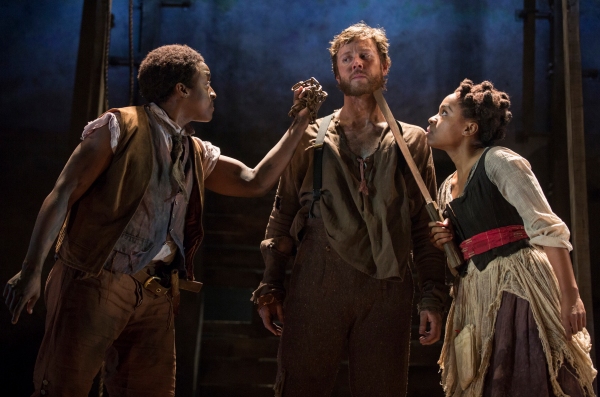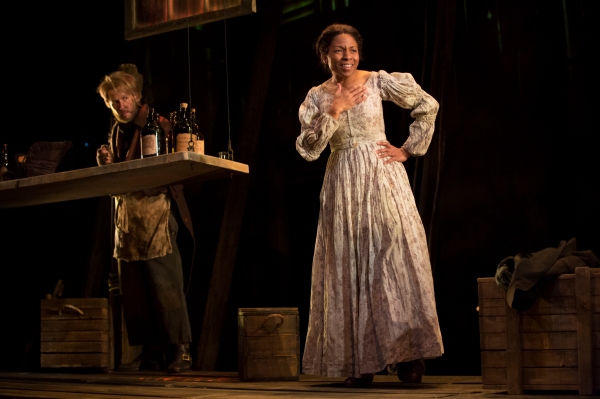
Dembi (Ito Aghayere) and Adjua (Kristolyn Lloyd) threaten John Cranston (Michael Izquierdo) in THE LIQUID PLAIN (photo by Joan Marcus)
The Pershing Square Signature Center
The Alice Griffin Jewel Box Theatre
480 West 42nd St. between Tenth & Eleventh Aves.
Tuesday – Sunday through March 29, $25
212-244-7529
www.signaturetheatre.org
As The Liquid Plain opens, two people find what they think is a dead body, but the supposed corpse comes back to life. Unfortunately, the play has no such luck, pretty much showing up DOA. Originally commissioned for the Oregon Shakespeare Festival’s ten-year “American Revolutions: The United States History Cyle” series, which also includes Lynn Nottage’s Sweat and Robert Schenkkan’s Tony-winning All the Way, Naomi Wallace’s The Liquid Plain is a disconcerting, bewildering look at slavery in the Atlantic region. The title comes from Phillis Wheatley’s 1773 poem “A Farewell to America,” in which she writes, “While for Brittania’s distant shore / We sweep the liquid plain, / And with astonish’d eyes explore / The wide-extended main.” The play begins on a section of ratty dock in 1791 Bristol, Rhode Island. Hiding in bleak surroundings, runaway slaves Adjua (Kristolyn Lloyd) and Dembi (Ito Aghayere) are trying to save enough money to get on a ship bound for Africa, but their plans are complicated by the arrival of John Cranston (Michael Izquierdo), a white man who has lost his memory after his near-murder by drowning. Against Dembi’s better judgment, Cranston joins the pair and starts helping them out, but when one-eyed scoundrel Balthazar (Karl Miller) and ship captain Liverpool Joe (Johnny Ramey) show up, truths are revealed that threaten Adjua and Dembi’s future. The second act takes place forty-six years later, as the well-spoken Bristol (LisaGay Hamilton) comes to Rhode Island from London, seeking her father. But when she meets up with Cranston, Dembi, the ghost of William Blake (Miller), and the wealthy and powerful former slaver and senator James De Wolfe (Robert Hogan), she discovers unsettling facts that tear her life apart.

Bristol (LisaGay Hamilton) searches for her past in Naomi Wallace play at the Signature (photo by Joan Marcus)
Although Wallace (Slaughter City, One Flea Spare) and director Kwame Kwei-Armah (Blues Brother Soul Sister, Elmina’s Kitchen), who previously collaborated on Wallace’s Things of Dry Hours, address some fascinating and lesser-known socioeconomic aspects of the slave trade in the North and the life of African Americans on the docks rather than on the plantation, the narrative is choppy and the dialogue befuddling. Meanwhile, the staging ranges from inventive to overstylized and confounding, and the plot twists feel forced when they’re not obvious. Influenced by Marcus Rediker’s book The Slave Ship: A Human History, Wallace tries to squeeze too much historical information into The Liquid Plain, which won the 2012 Horton Foote Prize for Promising New American Play. Perhaps it looked better on paper, but onstage, in this production running at the Signature through March 29, it’s all wet.